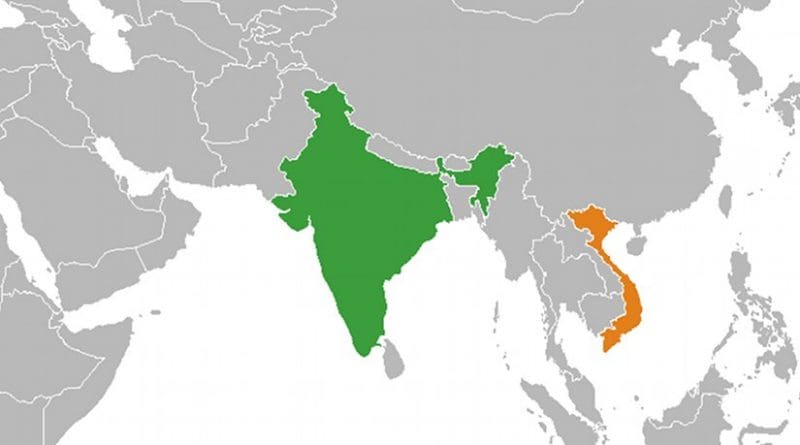India And Vietnam: Four Decades Of Cooperation And Partnership – Analysis
By Praful Adagale and Vinayak Lashkar
The relationship between India and Vietnam has flourished significantly after the post Cold War era. India’s support for recognition of a unified Vietnam and Hanoi’s backing for India during the formation of Bangladesh acted as magnetism for building the relationship to a Strategic Partnership. Both countries marked the 5th anniversary of their Strategic Partnership (2007-2012) and celebrated their 40th anniversary of Cooperation and Partnership in Vietnam’s South Ho Chi Minh city in January this year.
The partnership builds on the pillars formed by the late Vietnamese President Ho Chin Minh and Indian Prime Minister, Jawaharlal Nehru. The partnership has been developed in all fields including politics, security and defence, trade and investment, culture, tourism and human resource development. India’s plan to formulate a ‘Look East’ policy as early as 1991, to capitalize on East Asia’s economic growth helped both countries to build a strong relationship in the last four decades.
The Arc of Advantage and Prosperity
The two countries signed an agreement in 2003 in which they envisioned creating an ‘Arc of Advantage and Prosperity’ in Southeast Asia. Their partnership represents a dominating force multiplier against Chinese ambitions and growing presence of both military and civilian power in the South China Sea. India’s relationship with Vietnam is within the framework of ASEAN, East Asia Summit and Asian Regional Forum (ARF) and international organizations like the WTO and UN.
Vietnam’s unique geo-strategic location provides it with a political advantage amongst all major powers in East Asia. Similarly, India’s geographical position in South Asia makes it an important actor in the strategic calculus surrounding the Indian Ocean. India and Vietnam share a history of a strained relationship and disputed borders with China. This fact generates a degree of commonality of interests in the foreign policy agendas of both countries towards China.
Vietnam holds a strategic position in India’s policy of ‘looking to the East’. From US$200 million in the year 2000, bilateral trade turnover has grown nearly 14 times in 2010. At present, the trade for the year 2011 was US$3.5 billion, and both countries estimate to meet their trade target of US$7 billion by 2015.
The giant leap in strategic cooperation can be seen from India’s investment of US$400 million in Vietnamese hydrocarbon sectors with Oil and Gas Cooperation Videsh Limited (OVL) investing US$225 million in oil exploration. However, this joint energy project between India and Vietnam in the South China Sea infringes on China’s territorial sovereignty, as per the reports from the Chinese media. The major reason has been that the present oil and gas exploration projects between India Vietnam enter waters under Chinese jurisdiction.
Another major collaborative effort in the field of Science and Technology is the establishment of the Advanced Resource centre in Information and Communication Technology on September 16, 2011, which has been setup under a US$2 million grant by India to Vietnam. It can be used for Web Portal Creation, GIS application and the Development of Web Information systems.
In terms of defence cooperation, Indian defence personnel have been paying visits to Vietnam since the end of the Cambodian crisis. In the post-Cold War period, there has been cooperation with regard to the training of Vietnamese military officers in India and visits by high-level military delegations. Vietnam has given India the right to use its port of Nha Trang in the South, and has ordered 6 Kilo-class submarines from the Admiralty Shipyards in St. Petersburg, which are likely to be inducted in 2012.
The Thrust in Future
The major area of cooperation in future will be to utilize Vietnam’s 60 shipbuilding yards and repairing yards to build cargo ships of up to 6,500 dead weight tonnage (DWT) and repair vessels of up to 50,000 DWT. There exists tremendous cooperation in construction of naval ships and building of submarines for the Vietnam Navy and cooperation between the Indian Coast Guard and the Vietnam Sea Police should be more effective to address the threats from piracy and terrorism.
India’s initiatives, in the form of Mekong Ganga Cooperation (MGC), the Bay of Bengal Initiative for Multi-Sectoral Technical and Economic Cooperation (BIMSTEC) and greater engagement with mainland Southeast Asian nations have been aimed at securing its extended neighbourhood. It is time for India to explore more impending areas for cooperation and to proactively engage with Vietnam along with developing countries from East Asia. India must address the major areas of concern affecting its relationship with Vietnam, like the continuous economic assistance pertaining to trade and investments, commercial and infrastructural developments and providing military and logistics support to Vietnam from China.
Vietnam in the 21st century will remain a focal point – a zone of attraction due to its geo-strategic location neighbouring China. Major powers, namely United States, Japan and India, will act as a catalyst to run its economic development and support Vietnam to counter the rise of China.
Vietnam will remain a zone of engagement for India and other major powers to explore areas of cooperation for energy security and military. How India utilizes this opportunity in the coming years to explore and discover newer areas of cooperation with Vietnam as well as to develop political, economic and military prowess for peaceful means, so as to counter China’s hegemonic rise the 21st century, remains to be seen. By now New Delhi is aware of China’s ambition and rising power in the South China Sea and Indian Ocean Region (IOR) region. India must utilize its missed opportunities with Vietnam and maintain an effective and competent partnership.
Praful Adagale and Vinayak Lashkar are Ph.D. Research Fellows at the Yashwantrao Chavan National Centre of International Security & Defence Analysis (YCNISDA), University of Pune.
Originally published by Diplomatist (Special Issue on India – EU Summit 2012), February 2012 and reprinted with permission.

